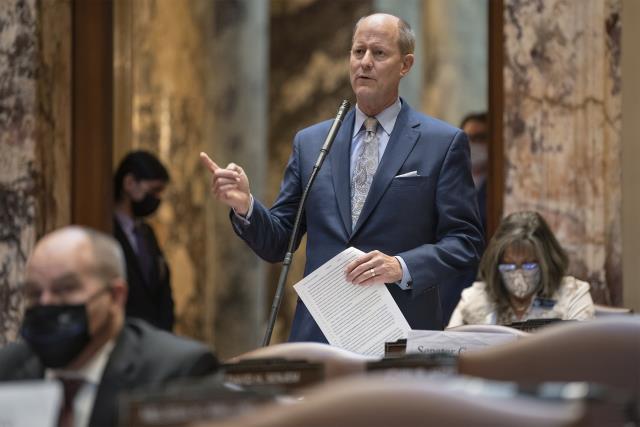 |
| Friends and neighbors,This last week saw a flurry of activity in the Senate in spite of the dispiriting cold weather. Through SF749 we ensured that cities which use resources borrowed from surrounding communities pay for it rather than forcing it on Minnesotans. And just today, with tri-partisan support, we passed SF2 which would limit the ability of any Governor to force schools to close or open through emergency powers. The best care we can give to our kids is through the hands of their parents, teachers, and school board members who can decide when and how to close or reopen their classrooms safely. Below you will find more details and links on those two bills, but as always please reach out to me if you have any questions or concerns about these or other state or legislative issues. I am happy to help. Sincerely, Senator Paul Gazelka Call my office: 651-296-4875 Email me: sen.paul.gazelka@senate.mnLocal Government Aid bill On Monday, the Senate passed legislation that would hold cities accountable to pay their mutual aid agreements and prevent Governor Walz from diverting funds away from education and healthcare to cover cities’ public safety costs that defund the police. I am committed to funding what it takes at a state level to keep Minnesotans safe during the upcoming Floyd trials. We are not going to bail out Minneapolis, and we are not going to take House language that ties the hands of law enforcement to respond appropriately to violence and riots to keep both themselves and their communities safe. The Minneapolis City Council’s vote last Friday to reinstate $6.4 million to hire more cops is a welcome step in the right direction ensuring the safety of the city and its residents. We felt this bill was necessary since the problem presented to us was the concern from other cities not being reimbursed when taking on extraordinary duties. However, no amount of money will fix the failed response that allowed riots and violence this summer. A leadership problem can’t be solved with legislation. Senator Bill Weber (R-Luverne), Chair of the Subcommittee on Property Taxes, wrote the bill to allow cities that provided mutual aid but haven’t been reimbursed for it yet to apply to have their Local Government Aid adjusted to match the amount owed. The funds would be provided by lowering the LGA from the city that owes the mutual aid payment. “Cities are given Local Government Aid to fund necessary functions of their government, which includes public safety,” Senator Weber explained. “While the state has a responsibility to protect the public’s safety, it is not every Minnesotan’s responsibility to pay for it when that community is actively undermining its own safeguards. The solution proposed in this bill is fair. It encourages law enforcement to be fully funded by cities and ensures that when neighboring communities answer the call that they are going to be reimbursed for their support.”  SF2 – schools reopening bill Today, the Minnesota Senate passed legislation that will protect students’ right to an excellent education at all times. The bill, Senate File 2, removes any governor’s authority to close schools or alter school schedules via executive order. Decisions about opening and closing will be left in the hands of individual school districts moving forward, where local officials have firsthand knowledge of their students’ needs. Senate Republicans are putting the decision-making authority back where it needs to be — exclusively in the hands of local school leaders. All the science says we can and should open schools for the academic and emotional health of our children. Unfortunately, far too many kids are still receiving most of their instruction by distance learning, which is unacceptable. It’s become obvious the main thing standing in the way from a full reopening of schools are the teacher’s unions. Their demands to delay in-person instruction is failing kids, parents, and our future. The bill says the governor may not use executive order authority to issue any order or to authorize the commissioner of education to alter school schedules, curtail school activities, or order schools closed. Gov. Walz’s executive orders closing schools have been among his most questioned and controversial orders of the outbreak. There is mounting evidence, including research from the CDC, that schools pose a minimal risk of spreading the coronavirus. A fall Reuters report that studied 191 countries also found no clear link between school reopenings and coronavirus surges. In addition, Axios looked at several studies and found schools are not Covid hotspots, and the Atlantic Magazine wrote that kids are not superspreaders and that it’s time to reopen schools. The New York Times reported on evidence that schools, especially elementary schools, are not “stoking community transmission.” |
